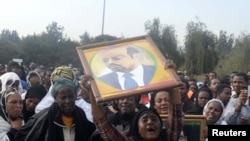Former U.S. ambassador to Ethiopia David Shinn said he expects a “relatively peaceful and stable transition” of power following the death of Prime Minister Meles Zenawi.
Shinn, adjunct professor at George Washington University’s Elliott School of International Affairs, said, “I don’t think you’re going to see a collapse of the country or any significant opposition expressing itself in the streets or anything. I think it will go rather smoothly.”
Deputy Prime Minister Hailemariam Desalegn is slated to be the new prime minister. However, a special session of parliament to endorse that appointment has been delayed. The postponement is not seen as an objection to appointing Hailemariam. Many MPs and other officials were busy attending Thursday’s funeral of Abune Paulos, leader of the Orthodox Church.
As for Meles’ legacy, Shinn said, “The legacy is several things. One would be his engagement in regional and even international issues to a much greater extent than you see from the leaders of most countries around the world and certainly most African leaders.”
That engagement includes the use of Ethiopian troops for U.N. peacekeeping missions and the military offensive into Somalia. He also spoke out on behalf of Africa regarding climate change. Shinn said Mr. Meles’ legacy also includes economic development and the building of infrastructure.
On the negative side, the former ambassador said, “He left a disappointing record on democratization, allowing greater opportunity for opposition politics and there were some obvious imperfections in his approach to human rights.”
Ethiopia has worked with the United States to help thwart terrorism. But Shinn said the two countries are not as close as allies as some would suggest.
“He had developed very close relations also with countries like China. There certainly was collaboration on regional issues and U.N. peacekeeping activities, also in terms of counter terrorism. But of course Meles saw this as being in the interest of Ethiopia. He was not doing this in order to ingratiate himself particularly with the United States. But he saw this as being integral to the security of Ethiopia itself,” said Shinn, who added that the Meles legacy was “kind of a mixed bag.”
Shinn sees no special significance in Meles’ attendance at the G8 Summit in Camp David, Maryland earlier this year. “He was invited I think because of the outsized role that he played on the African scene and simply because he was one of the most intelligent leaders on the continent.”
The George Washington University professor said it’s unclear whether there will be any easing of restrictions on opposition political activity or media freedoms. “It’s very difficult to say how that is going to play out. My guess is there will be some change. How significant it will be is quite another matter. One often forgets that the history of centralized control in Ethiopia goes back more than two millennia. You don’t change two millennia of precedence overnight.”
Shinn, adjunct professor at George Washington University’s Elliott School of International Affairs, said, “I don’t think you’re going to see a collapse of the country or any significant opposition expressing itself in the streets or anything. I think it will go rather smoothly.”
Deputy Prime Minister Hailemariam Desalegn is slated to be the new prime minister. However, a special session of parliament to endorse that appointment has been delayed. The postponement is not seen as an objection to appointing Hailemariam. Many MPs and other officials were busy attending Thursday’s funeral of Abune Paulos, leader of the Orthodox Church.
As for Meles’ legacy, Shinn said, “The legacy is several things. One would be his engagement in regional and even international issues to a much greater extent than you see from the leaders of most countries around the world and certainly most African leaders.”
That engagement includes the use of Ethiopian troops for U.N. peacekeeping missions and the military offensive into Somalia. He also spoke out on behalf of Africa regarding climate change. Shinn said Mr. Meles’ legacy also includes economic development and the building of infrastructure.
On the negative side, the former ambassador said, “He left a disappointing record on democratization, allowing greater opportunity for opposition politics and there were some obvious imperfections in his approach to human rights.”
Ethiopia has worked with the United States to help thwart terrorism. But Shinn said the two countries are not as close as allies as some would suggest.
“He had developed very close relations also with countries like China. There certainly was collaboration on regional issues and U.N. peacekeeping activities, also in terms of counter terrorism. But of course Meles saw this as being in the interest of Ethiopia. He was not doing this in order to ingratiate himself particularly with the United States. But he saw this as being integral to the security of Ethiopia itself,” said Shinn, who added that the Meles legacy was “kind of a mixed bag.”
Shinn sees no special significance in Meles’ attendance at the G8 Summit in Camp David, Maryland earlier this year. “He was invited I think because of the outsized role that he played on the African scene and simply because he was one of the most intelligent leaders on the continent.”
The George Washington University professor said it’s unclear whether there will be any easing of restrictions on opposition political activity or media freedoms. “It’s very difficult to say how that is going to play out. My guess is there will be some change. How significant it will be is quite another matter. One often forgets that the history of centralized control in Ethiopia goes back more than two millennia. You don’t change two millennia of precedence overnight.”




